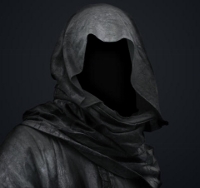86 Spring, 514 A.V.
The brand new moon left the Syliran night pitch black. Whatever little light there could have been was showered out by the heavy rain. Visibility was practically zero, but that didn't matter, because Kellerman needed only to follow the shoreline, which he could hear. The crashing waves were especially loud with today's shrilling winds and the relentless downpour. Zeltiva, his hometown and destination, was nigh, and the flashing memories of his childhood would have filled him with shudders if he were alive.
Completely unmaterialized, Kellerman flew through the air, the drops of water still spherical as they shot to the ground from their anvil clouds. He stopped blinking as soon as he recognized the landscape, which was barely visible; he began flying close to the ground to get the most out of his visit home. Whenever he spotted poor wet travelers, he increased altitude so as to attract as little attention as possible. Kellerman only wanted to be seen materialized. The only people that have seen him unmaterialized are some of his victims, which are already dead.
Kellerman's sentimental visit to Zeltiva would last anywhere from a night to the rest of his "life"; he hadn't decided yet. Traveling on ground level reminded him of his time as a human, although his last couple of years were very hazy and he didn't remember several key details about his life. Most notably, and shamefully, he had forgotten his given name, accepting his prison nickname "Kellerman."
Kellerman longed to be a living human again, but how else could he do his job forever?
In no time, the docks were in view. Matthews was in high tide, the sound of its spray working in rhythm against the slippery docks. The ghost slowed down as he entered Zeltiva, moving slowly and swinging his legs like a person. He didn't materialize, since he wasn't around any people yet, and he didn't want to waste his energy. He hugged the walls and took the alleyways, avoiding the main streets.
Long ago, Kellerman was ashamed of escaping the city's prison, and this feeling fueled his terrible more-than-weekly habit. The ghost kept to the dark streets now not because he was afraid of being seen, but because he knew that "miscreants" lurked there... and he was after them. After half a bell of winding around the city in the longest route, Kellerman found his prey.
An old, pale human-looking creature with tattered clothes was sitting on the ground with purses and sacks of gold. He must have been out of his mind to be outside in this weather. Perhaps he had nowhere else to go.
The hoodlum was dumping the mizas and trashing the purses; at least a dozen purses lay next to him. He had most likely picked them all in just one day, making him an experienced thief.
That man had now received a death sentence from Judge Kellerman. Kellerman looked left and right and listened for footsteps. Guards were never good news in times likes these. Hearing nothing, he proceeded.
Stealthily, the unmaterialized ghost floated up and slid down behind the pickpocket, whose back was tight against the wall of one of the buildings in the alley.
Kellerman stood there for a moment, his whole body in the building save for his face. The rain pittered and pattered on the top of the thief's head, which was only inches away from Kellerman's own face. The ghost could see the vagrant's wide grin from behind, as his cheeks were sticking back, and the corners of his eyes creased.
Kellerman slowly stuck his hands out and brought them around the thief's neck, only a hair away from his skin. Focusing his soulmist projection, Kellerman tightly clasped his frigid hands, choking the life out of the man while simultaneously freezing his neck. The combined effect was lethal in seconds. He fell limp, the blood in his neck frozen, his nerves dead, his trachea torn, and his spine fractured. The man's brain was dead.
Kellerman floated out from the wall and turned around, admiring his fresh kill. Across his nearly one hundred years, he had murdered at least six thousand men, almost no women, and maybe a child or two; at least one a week.
But there were always more to extinguish from Mizahar, and even if he killed every criminal, no matter how small their action, more would take their place in a minute. But his efforts certainly did help.
Kellerman usually only killed his victims when they were alone. He rarely haunted them beforehand because it made them much harder to kill. It was all about surprise. The fun effect was watching their brain try to receive adrenaline from their adrenal glands while the neck was frozen through. Their necks would bulge below the point of depression with muscle, blood, and every possible fluid and contraction. Then they turned blue and relaxed. It was as if they were finally apologizing for their evil ways and coming to terms with their deaths. They were mad.
Kellerman occasionally set his eyes on a major criminal. On them, he sometimes was more creative, sticking his fingers in their eyes and that sort of cruel murder. But that was only for those that deserved it: killers, torturers, rapists. Mass murderers were rare; most of the homicidal criminals that Kellerman killed, although there were not many, had only one count, and were not repeat offenders.
The ghost continued on his way now, satisfied that he had rid the city of this thief. Surely, the citizens will be thankful as soon as they find his body. After all, a speedy execution is justified for any and every crime, whether the beliéved suspect is convicted or not. He walked out into the streets and began looking about at the actual city, moving away from the alleyways. He materialized at the first sight of a person and moved his legs. The ghost's competent skill in the near pitch darkness left him safe. But the passerby was still noticeably uneasy, perhaps from the bleached white clothes worn by Kellerman, which stood out. He doubted that the stranger knew about psych ward, because by now it was historical. But Kellerman felt that he didn't belong in the psych ward when he was alive. I am innocent. Why would they say that I am mad, if I did no thing wrong? Kellerman was convinced that he was the victim. [/i]Now, in any case, I am a saint[/i]. He faded away again when he passed the stranger. Kellerman was becoming increasingly more convincing with his materialization and feeling less fatigued from each time.
Few people were out during a midnight rainstorm. Kellerman smiled, feeling relaxed in his hometown, even though right now it was dark, wet, and empty. He was given family and born in this city, and he lost his family and died in this city, as well. He felt neither contempt nor love for Zeltiva. But he loved its culture; its high class and its devotion to education. On top of that, the shipyards and docks were beautiful. The whole city smelled of the sea, and the chilly winds created a serene atmosphere. Unfortunately, the ghost couldn't smell or feel any of these things.
A century ago, Kellerman knew everything about Zeltiva. Now, his knowledge was almost useless when it came to navigation and the new fads, styles of speech, and all quickly changing things. The significant landmarks still stood where he remembered them and the landscape was unchanged, obviously. Many familiar buildings were still standing, either because they were durable or they were restored.
Kellerman searched desperately for the prison. He wanted to face his old fear. The wretched place no longer gave him the shivers, but that was probably because he was a ghost now... and mostly insane. He finally came upon it after two bells of searching the city and his own memory. The prison itself was hidden in Zeltiva, and back in the day, few people knew about it or mentioned it except the prisoners themselves and some law officials. By now, its count of people that acknowledged it as a location must be close to none.
The prison had not been restored since his time, so it lost its shine and blended into the rest of the city. It looked run down, cracked up, and dirty. He floated through the entrance and explored the inside, peering at the dark, stone walls and the barred doors all around. This place, he knew by heart.
Kellerman immediately headed for the psychiatric ward. He passed by the halls and rooms of cracked stone, careful not to awake any sleeping prisoners or guards. But when he approached the entrance of the psychiatric care wing, he found a wall of stone blocks. At first, Kellerman thought he had taken a wrong turn. Upon closer examination, he saw that the stone was newer, almost a century old, while the prison was much older. He went through the wall and startled himself. The entire psych ward was torn out of the building. Kellerman was midair. Below him were some small residential establishments. The wing must have been demolished soon after he died. Perhaps his suicide contributed to the closing of the place.
Kellerman left the prison not knowing how to feel about his discovery: happy that the mentally impaired were no longer subject to the tortures of the prison's "treatment," or horrified to imagine what happens to them now; whether they are killed, or brought to the prison's general population to share cells with the "normal."
He continued touring the city until he came upon a spot that was void of light and people. The sudden darkness reminded the ghost of death. He thought about the noble girl that lived next door to him. Kellerman, at the bottom of Zeltivan society, never dared to speak to her. Now, as an old man of sort, he looked back and realized he should have given her a shot before she died. She could have been elsewhere at that exact time if he had talked to her earlier, perhaps affecting her schedule in the future. He sat down on the ground, submerged in complete darkness. He didn't bother going back to his home, because the shanty hut was obviously no longer there.
Kellerman didn't know where he was exactly, but he was wedged in between two buildings, with barely ten feet of space. The only sound was the roaring rain and the only sight was darkness. It was odd that in such a city there could be so much quiet in some spots, even if it was late and it was raining.
He sat and stared into the blackness. He couldn't tell whether his eyes were open or closed, or looking left or right, or up or down. The ghost didn't feel frustrated at this; on the contrary, he felt relaxed, having no reason or ability to look at anything in particular or anything at all. |
|
![]() by Kellerman on April 26th, 2014, 12:05 am
by Kellerman on April 26th, 2014, 12:05 am 

![]() by Marina Agamand on April 28th, 2014, 7:09 pm
by Marina Agamand on April 28th, 2014, 7:09 pm 
![]() by Kellerman on April 29th, 2014, 1:05 am
by Kellerman on April 29th, 2014, 1:05 am 

![]() by Marina Agamand on October 30th, 2014, 5:31 pm
by Marina Agamand on October 30th, 2014, 5:31 pm 
![]() by Perplexity on November 9th, 2014, 7:02 pm
by Perplexity on November 9th, 2014, 7:02 pm 

